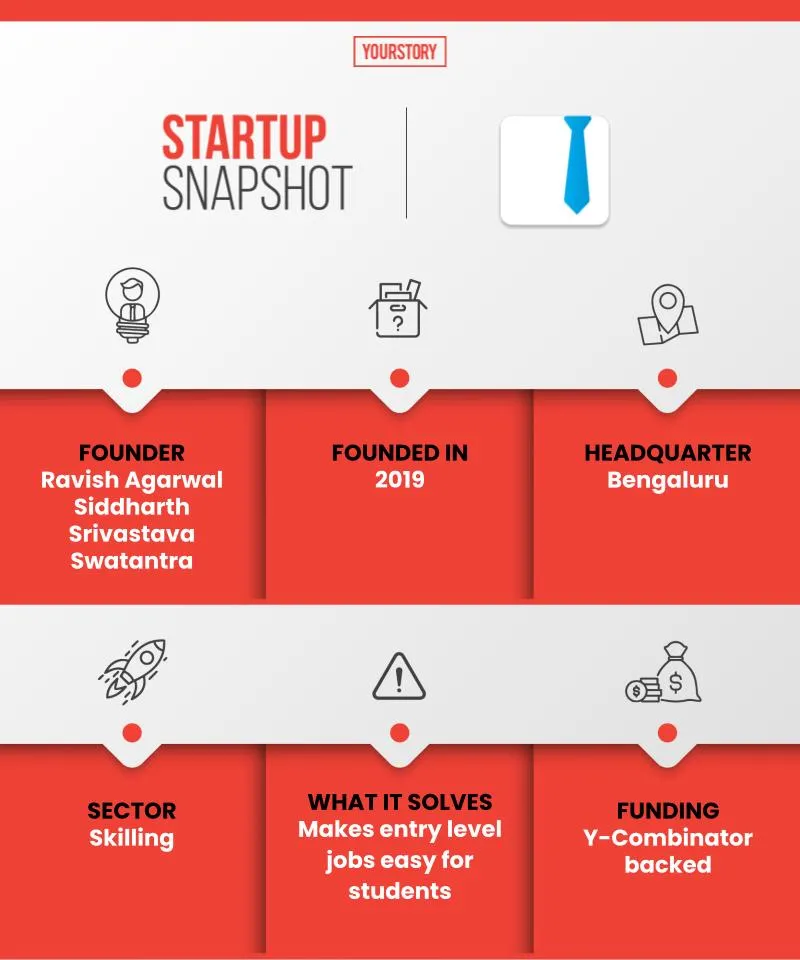With Paytm, ShareChat, and Bigbasket as its clients, how YC-backed Able Jobs is making entry-level jobs easier for students
Bengaluru-based Able Jobs is a startup that trains entry-level, non-tech graduate job seekers for the role of sales and support.
For Ravish Agarwal, Siddharth Srivastava, and Swatantra Kumar, the world of edtech, startups, and skilling was nothing new. In fact, Ravish was already running an edtech startup and was also managing the India B2C business for an American education company, Udacity. Siddhartha and Swatantra have collective experience in companies like — Udacity, Placement, , and Yatra.
All the exposure to the startup and edtech world meant the trio felt there was a large gap to be addressed.
“We were coaching BA, BBA, and BCom graduates for college exams, and that is when we realised that most of the people struggle to get a job. We thought of helping these people to be jobs-ready and started training them for jobs directly. We started by coaching people on the phone first, then we got on to Whatsapp, and finally, after some placements, we launched the Able Jobs app to help students prepare for their jobs,” explains Ravish.

Skill development
They launched Able Jobs in May 2019 out of Bengaluru. Backed by Y Combinator, the startup has raised a total of $1.8 million in its seed round from Y Combinator, Elevation Capital (Saif Partners), Titan capital, Firstcheque, and marquee angels like Neeraj Arora.
Able Jobs trains entry-level job seekers for roles in sales and support. Job seekers can download their app and go through the training courses available. Post completion, the team connects them to companies that are hiring for suitable roles.
The problem it is solving
“We are solving the problem of employability of the non-tech workforce. Every year, more than 18 million people graduate from non-technical degree courses like BA, BCom, and BBA, but struggle to get a job. Our rigorous training programme, designed in-house, ensures that fresh graduates upskill themselves to get the job. The courses are highly vocational in nature, and delivered online with the help of experienced trainers,” says Ravish.
The initial challenge was in designing the right pedagogy so they could remove the subjectivity from non-tech jobs.
Ravish explains that over time, they closely worked with students and companies to understand the key gaps, and accordingly designed the content, proprietary frameworks, and assessment. This helped them evaluate a candidate in-depth and provide them with the skill required to do the job.
“Our app ensures that the content is delivered perfectly, and job seekers can get the skills required for a job. The student can avail free courses or enrol in a paid course, and undergo rigorous training from us for the job. Companies can post job openings with us and get talent fulfilled. We charge companies on a per hire basis and charge students on placements. India's most valued startups like , , , hire from our trained pool,” says Ravish.

The market
While the startup refused to share its charges, it said the cost may vary on the number, location and skills for candidates and companies. In recent years, the skill training segment is fast growing. The pandemic and subsequent job losses have made everyone sit up and take note of the need for skilling and the large skill gap.
A report by RedSeer and Omidyar Network India says the coronavirus pandemic has proved to be one of the biggest game-changers for India’s edtech sector. Online education offerings for classes 1 to 12 are projected to increase 6.3 times by 2022, creating a $1.7 billion market.
Startups like , , Lambda School, too, are working on the skilling segment. Speaking of how Able Jobs is different, Ravish explains its pedagogy and training methodology is the biggest differentiator.
“Our training is fast-paced, so a learner can comfortably complete a module in a short span. Our training is relevant, and we only focus on the core skills and knowledge a learner needs. It is also rooted in what happens in real life, that is, they are taught skills that they will use and apply not only in their interview but also in their jobs, says Ravish.
He adds that over 2,000 people have so far secured jobs after completing the Able Jobs courses, and the startup has seen a 13X growth in course enrolments despite COVID-19.
“We want to be the go-to destination for entry-level job preparations for graduating students. Right now, we are focusing on certain functions, and as we scale, we will be building an effective feature for self and group practice on the app that can take people closer to their jobs,” says Ravish.
Edited by Anju Narayanan




![[YS Exclusive] Why San Francisco’s coding bootcamp Lambda School is placing its bets on India](https://images.yourstory.com/cs/2/730b50702d6c11e9aa979329348d4c3e/TeamatLambdaSchool1569404013364png?fm=png&auto=format&h=100&w=100&crop=entropy&fit=crop)




